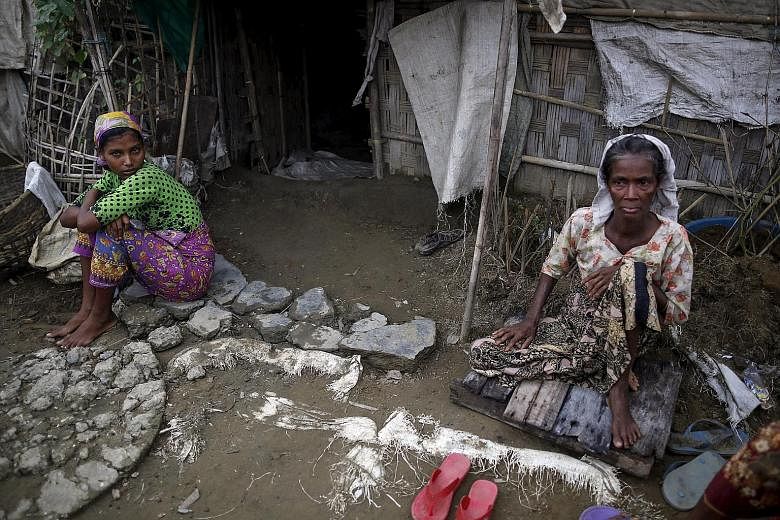BANGKOK • A reputed international human rights group at Yale Law school in Connecticut in the United States has concluded there was "strong evidence'' that the Myanmar government was "responsible for genocide against Rohingya Muslims'' and called for a United Nations Commission of Inquiry.
The Yale group and Fortify Rights, which had commissioned the "legal analysis", revealed their findings on Thursday.
Separately on the same day, the International State Crime Initiative (ISCI) at Queen Mary University of London, in a 108-page report concluded: "Campaigns of violence towards Rohingya are highly organised and genocidal in intent."
A week earlier, a former US Congressman told a foreign affairs subcommittee hearing that Myanmar topped the list of countries in the world where genocide and mass atrocities are likely.
However, Mr Richard Horsey, an independent analyst based in Yangon and former top UN official in the country, notes that the term "genocide", is a loaded one and can be inflammatory.

"There is extreme discrimination against Muslim communities in Rakhine State, including the Rohingya, and they are heavily marginalised," he wrote in an e-mail to The Straits Times. "But genocide is not a helpful lens through which to view this situation. An accurate diagnosis is essential to develop the right interventions. Incendiary rhetoric will make that more difficult.''
The Rohingya - comprising around one million out of a population of around three million in the state - are seen by local Rakhine Buddhists as historically recent immigrants from neighbouring Bangladesh's Chittagong area, out to grab land and Islamise the state.
The Rohingya have been discriminated against for decades. Violence in 2012 killed more than 200 and drove some 140,000 Rohingya from their homes into squalid camps.
Thousands flee every year on rickety boats, the exodus spawning a migrant crisis across the region early this year.
Rakhines have little love lost for the Bamar or Burman majority, but on the Rohingya issue they concur. There has also been a surge of Burman Buddhist nationalism in Myanmar, which has morphed into anti-Muslim violence outside Rakhine state.
But the genocide accusations focus mainly on the Rohingya issue.
The government of President Thein Sein has been accused of turning a blind eye, and there is certainly deep-seated prejudice in Burman society, against the Rohingya, who are not recognised as one of Myanmar's 135 official ethnic races.
But the President did send in the army to control the violence in Rakhine in 2012, and later replaced the Rakhine chief minister with a handpicked army general to ensure stability. Since then, while the Rohingya have been disenfranchised, live in poverty and face a dead end, there has been no major violence.
There is some degree of access for international aid, some schools have opened, and the authorities have allowed up to 10,000 Rohingya to return from the camps to their original homes - quietly, to not inflame the local Rakhines.
"The situation is horrible, but stable," said a Myanmar-based human rights activist familiar with Rakhine state, speaking on condition of anonymity.
"There are certainly a lot of murky things going on, but I don't see any intent to commit genocide.''
"If there was really a compelling case for genocide, there would be a lot more agreement," he said.
Another analyst who asked not to be identified, in a telephone interview, said: "If you want to find a genocide, you will find a genocide. We should be careful when using this terminology; it used to be that this term was used for an exceptional thing."
Historically recent genocides occurred in Bosnia-Herzegovina - formerly part of Yugoslavia - in 1992-95 when 100,000 to 200,000 mostly Bosnian Muslims were massacred; in Rwanda in 1994 when 800,000 Tutsis were systematically killed; in Cambodia from 1975-79 when Pol Pot's Khmer Rouge killed an estimated two million; and in 1938-45 when Nazi Germany under Adolf Hitler killed at least six million, mostly Jewish, people.
For genocide to fall under the UN Genocide Convention's definition, one or more of the following actions must be apparent: Killing or causing serious bodily or mental harm to members of a group; deliberately inflicting conditions calculated to destroy the group; imposing measures to prevent births; and forcibly transferring children from the group.
Fortify Rights in a statement said: "Strong evidence exists to establish the elements of the crime of genocide: That Rohingya are a protected group as defined under the Genocide Convention; that Rohingya have suffered acts of genocide as enumerated by the Convention; and that those acts were committed with the intent to destroy Rohingya as a group, in whole or in part."
Ms Katherine Munyan of the Yale group said: "We think there is strong evidence to support a conclusion that genocide has occurred.''
The ISCI's report states that "the systematic, planned and targeted weakening of the Rohingya through mass violence and other measures, as well as the regime's successive implementation of discriminatory and persecutory policies against them, amounts to a process of genocide".
But diplomats say it would take a lot for the outside world to sign off on the terminology.
And Mr Charles Petrie, a former top UN official in Myanmar who, as a UN humanitarian officer witnessed the genocide in Rwanda in 1994, said in an interview: "I don't think it's proven that this (alleged genocide) is official government policy.''
"Harping on genocide of Rohingya is almost reductionist and risks distracting attention from the broader issue of anti-Muslim sentiment."
"In the past, the label of genocide was needed in Myanmar to further the case of advocacy groups for an absolute boycott of the regime.''
"Today using the term, aside from being divisive and potentially incorrect, will only ensure that opportunities and options to try to resolve the issue to be addressed will not be available.''


